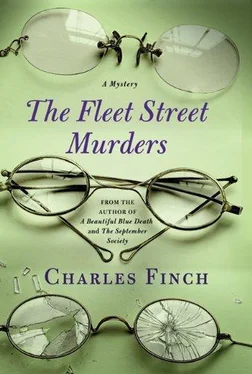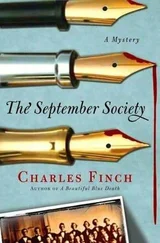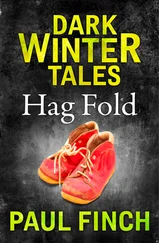Charles Finch - Fleet Street murders
Здесь есть возможность читать онлайн «Charles Finch - Fleet Street murders» весь текст электронной книги совершенно бесплатно (целиком полную версию без сокращений). В некоторых случаях можно слушать аудио, скачать через торрент в формате fb2 и присутствует краткое содержание. Жанр: Исторический детектив, на английском языке. Описание произведения, (предисловие) а так же отзывы посетителей доступны на портале библиотеки ЛибКат.
- Название:Fleet Street murders
- Автор:
- Жанр:
- Год:неизвестен
- ISBN:нет данных
- Рейтинг книги:5 / 5. Голосов: 1
-
Избранное:Добавить в избранное
- Отзывы:
-
Ваша оценка:
- 100
- 1
- 2
- 3
- 4
- 5
Fleet Street murders: краткое содержание, описание и аннотация
Предлагаем к чтению аннотацию, описание, краткое содержание или предисловие (зависит от того, что написал сам автор книги «Fleet Street murders»). Если вы не нашли необходимую информацию о книге — напишите в комментариях, мы постараемся отыскать её.
Fleet Street murders — читать онлайн бесплатно полную книгу (весь текст) целиком
Ниже представлен текст книги, разбитый по страницам. Система сохранения места последней прочитанной страницы, позволяет с удобством читать онлайн бесплатно книгу «Fleet Street murders», без необходимости каждый раз заново искать на чём Вы остановились. Поставьте закладку, и сможете в любой момент перейти на страницу, на которой закончили чтение.
Интервал:
Закладка:
“The banker wasn’t reluctant to do that, sir?” Graham asked with some astonishment.
“What? Oh, I see what you mean!” Dallington laughed heartily, still pacing the room. “No, you don’t understand, I’m afraid.”
“What don’t we understand? It seems profoundly unlikely,” said Lenox. “Banks aren’t known for their accessibility.”
Dallington laughed again. “You must understand-for years I’ve been poaching out of my parents’ accounts. Since I was thirteen or so. I know all the most corrupt men at the bank.”
“You amaze me, John!”
Dallington waved a hand. “Nothing too heavy-a quid here or there, you know.”
“I see.” Lenox couldn’t help but smile. “So, then, you knew which man to visit?”
“Yes! I only thought of it this morning. I told them it was fearfully important and acted very hushed and secretive, and you know they like to pal around with a duke’s son.”
“I can’t help but disapprove,” Lenox said, but still with a smile on his face. “At any rate, it was well done.”
Quietly Graham said, “That must mean Mr. Barnard has fled to Geneva for good.”
“Yes, perhaps,” said Lenox, now furrowing his brow, “and perhaps it means he felt some imminent danger. From Winston Carruthers, from Hiram Smalls, from Exeter. Graham, do something for me, would you?”
“Of course, sir.”
“Go to Barnard’s house in Grosvenor Square and see what’s happening there, whether the servants have remained, whether the upper floors are shut. It’s such a massive place that if he’s really left it for good they may still be in the middle of closing it.”
“Very good, sir. The usual method?”
Graham had a tenderly cultivated skill for quick friendship with fellow servants. Lenox had often asked him to employ it on a case’s behalf. “Yes, precisely,” said the detective.
Graham left, and Dallington and Lenox sat silent for some time, Lenox staring into the fire and contemplating Barnard’s actions.
Suddenly Dallington burst into speech. “Listen, Lenox-I want to apologize. I came to you in the absolute certainty that my friend-my acquaintance, whom if I acknowledge it I only knew briefly-was innocent, and I was wrong.”
Lenox waved a dismissive hand. “You’re young,” he said. “There are many lessons before you, some harder than this one.”
“I doubt that.”
“Well, perhaps not. I think in our first case together you had such great success-in fact, saved my life-that it must have seemed easy to you. All too often things are blurry, though, John. It’s the way of the world. Humans are blurry creatures,” said Lenox. “Now-did you learn anything else at all about Barnard’s last few weeks?”
With a discouraged scowl, Dallington shook his head. “Not much. He was as upright as a parson the whole time. In his house, at his club, at his office-”
“Office?”
“In the Mint. He kept an office after he left-insisted on it, to smooth the transition to the next fellow, he said.”
“Did he see anybody?”
“Not to speak of. He had been to one or two parties.”
“He went to Geneva without any notice?”
“Yes, apparently-or on short notice. Announced he would go in the morning and left a few hours later.”
There was a noise at the door then, followed by footsteps in the hallway. Dallington and Lenox exchanged a look, then stared at the closed library door, waiting for it to open.
“Where is Mary?” said Lenox irritably after a moment had passed.
Dallington stood up and peeked out of the door.
“Good God, there’s a chap in your hallway who looks as if he might eat glass for a lark,” said the young lord in an urgent whisper. “Head like a walnut.”
Lenox laughed and stood up. “That must be Skaggs.”
“Who the devil is Skaggs?”
“You’ll see. Very useful chap, quite intelligent.” Lenox went to the door and called out, “You must come into the library, Mr. Skaggs! Would you like a cup of tea? This is John Dallington, by the way.”
“Something stronger wouldn’t go amiss,” said Skaggs, shaking hands with Dallington and Lenox. “Been cold.”
“How about a glass of brandy?”
Skaggs nodded approvingly.
“Do you have any news?” Lenox asked, walking to the sideboard where he kept his liquor. “It seems to us that Barnard has been acting strangely. John, I hired Mr. Skaggs to trail George Barnard to Geneva.”
“Nothing strange at all,” said Skaggs, accepting a glass of brandy and sitting. “Well, except one thing.”
“Yes?”
“Mr. Barnard never went to Geneva.”
“What!” said Dallington.
“No. In fact, I very much doubt he left London,” said the investigator, a small, triumphant smile on his face.
“How did you draw these conclusions?” asked Lenox.
“It was simple enough to check on his travel out of the country. There’s no doubt that he left by his own carriage for Felixstowe, from which he was to take a ferry south, but he wasn’t on any of the company’s passenger lists, and nobody who took a first class cabin answered to his description. He hadn’t hired a boat privately, either, according to the local operators.”
“He might have done any of these things under a false name, however,” said Dallington.
Lenox shook his head. “Why? He spread it far and wide that he was going to Geneva. No reason to cover his trail, was there?”
“Moreover, I wired to Geneva-I haven’t had to go, because there was plenty of evidence on these shores-and he never arrived at the conference he was meant to attend,” Skaggs said.
“He might have gone anywhere on the Continent.”
“If he had left Felixstowe,” said Skaggs. “He might have gone to another port, though again, why go to the trouble of doing that? No, I firmly believe he never left England. Or London, for that matter. I think he took his carriage to the edge of town, so that everyone could see he had left, turned around, and came home with the curtains drawn over the windows. Even at night, perhaps.”
“Surely he’s in the countryside, then?” asked Dallington.
“London,” said Skaggs stubbornly.
“Why don’t you believe he left the city?”
Skaggs smiled. “Horseshoes.”
“What do you mean?” Lenox asked.
“I visited his stables. His horses’ shoes haven’t been changed for two weeks, I discovered in the course of an idle chat with the groom, and when I picked up one of their hooves there was practically no wear on the shoe. They haven’t traveled more than a few miles, I’d reckon.”
“Wonderfully done,” said Lenox, smiling.
Rather dismally, Dallington said, “I’ve much to learn, I see.”
“Why would he have pretended to leave town?” asked Lenox thoughtfully.
After half an hour or so in which the three men discussed the subject, Skaggs left, gracefully accepting Lenox’s compliments, and shortly thereafter Graham returned from Barnard’s nearby house, flushed red with the cold.
“Well?” Lenox asked.
“It’s completely dark, sir, the house. Only two maids are there, who will stay until the new tenant arrives.”
“New tenant?”
“Ah-the most consequential part of it, sir-Mr. Barnard has sold his house. The staff understood that he was retiring permanently to the country and have been telling all visitors as much. They have been packing his things for the past several days.”
The idea of Barnard living outside of London was laughable-it was his home and his solace, the center of his spiderweb, and he despised the northern life he had sloughed off when he came to the metropolis to make a success of himself.
Why, then, between Geneva and the country, was he trying so hard to persuade everybody that he was gone forever?
Читать дальшеИнтервал:
Закладка:
Похожие книги на «Fleet Street murders»
Представляем Вашему вниманию похожие книги на «Fleet Street murders» списком для выбора. Мы отобрали схожую по названию и смыслу литературу в надежде предоставить читателям больше вариантов отыскать новые, интересные, ещё непрочитанные произведения.
Обсуждение, отзывы о книге «Fleet Street murders» и просто собственные мнения читателей. Оставьте ваши комментарии, напишите, что Вы думаете о произведении, его смысле или главных героях. Укажите что конкретно понравилось, а что нет, и почему Вы так считаете.












